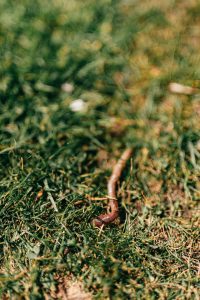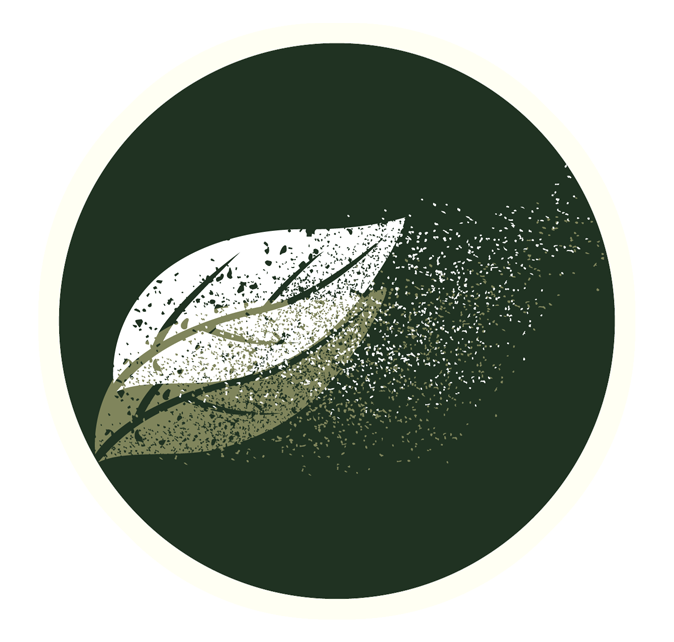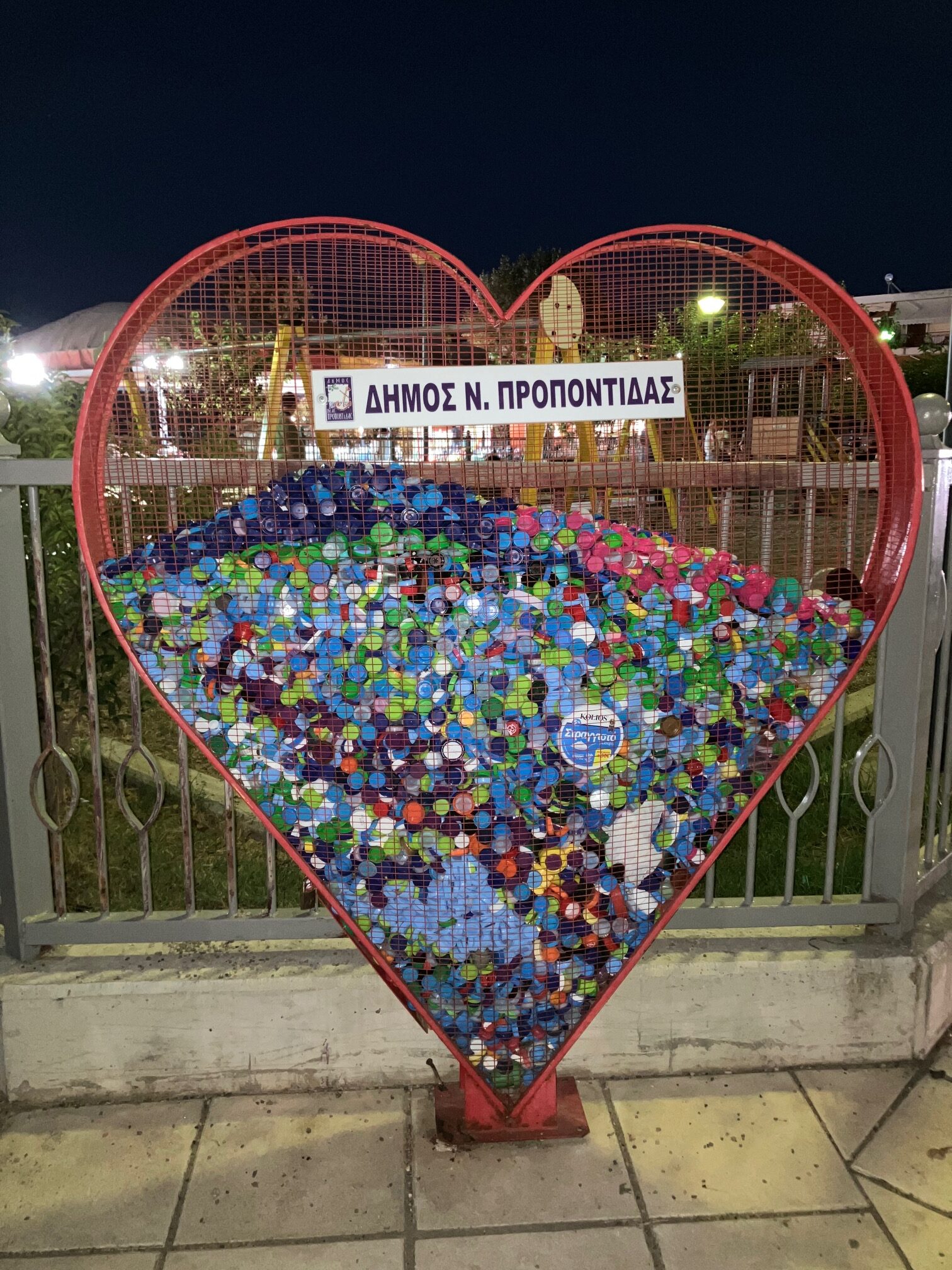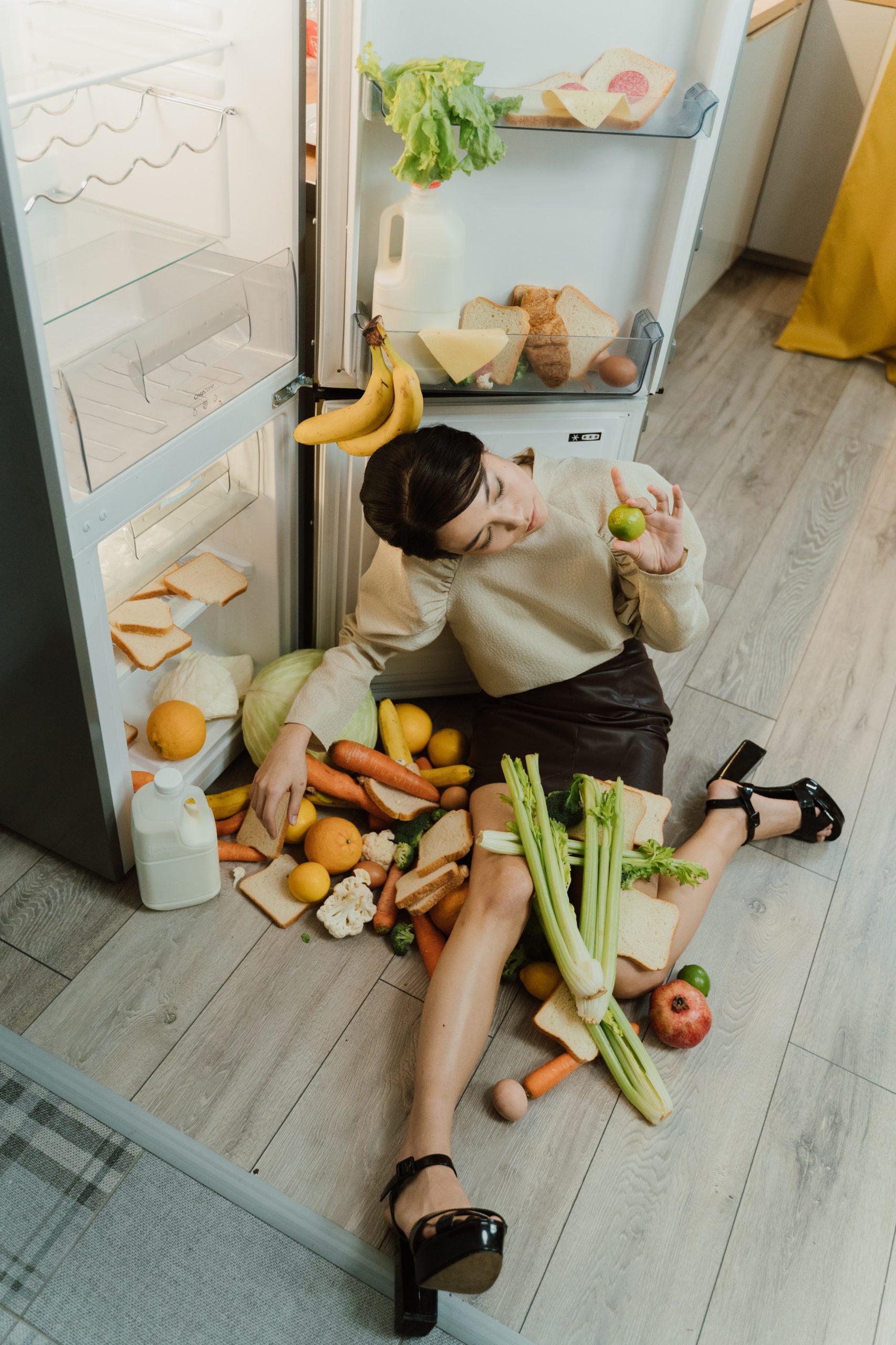With Net Zero Week coming up, we have compiled a list of small eco-friendly actions that can have a big cumulative impact.
Net Zero is the world’s answer to stopping climate change through emission reduction and removal – that means reducing greenhouse gas emissions to their lowest amount and removing remaining emissions from the atmosphere.
Some of the ideas we’ve included are about making your own produce and products, which can be fun, economical and empowering. Doing it yourself also raises your awareness of what ingredients are added to the products you buy.
We took inspiration from some of our favourite books and it was a reminder to constantly re-read eco books – there’s so much you forget. We hope some of these ideas give you inspiration too.
GARDEN
Grow it yourself: Food shortages, higher prices and environmental awareness have prompted many people to try growing their own. To make it cost-effective, grow vegetables that have a reliable heavy crop, such as chillis, tomatoes, courgettes, salad leaves, herbs and cut-and-come-again leafy greens such as kale and chard.
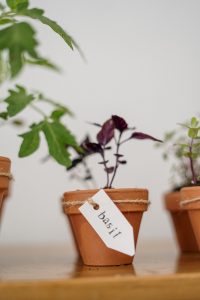
Try homegrown fertilisers. Comfrey is one of the best. Grow Bocking 14, which is sterile and won’t self-seed everywhere. It can be used to make compost activator, liquid feed and fertilising mulch. Harvest it a couple of times a year, steeping leaves for a couple of weeks in a bucket of water. Nettle leaves are a good source of nitrogen and steeping them is great for feeding leafy plants. Use gloves to pick them. Decant the liquid into plastic bottles for storage and put the decomposing leaves in the compost bin. Dilute one part of the liquid to ten parts water.
Troublesome weeds can be controlled quickly without weed killers or path clearing products – pour over boiling water straight from the kettle followed immediately by a light sprinkling of table salt.
HOME
Many are the great tips to be found in the books and Instagram of eco-influencer Nancy Birtwhistle (Green Living Made Easy) but some of the best are her recipes for cleaning creams.
Cream Cleaner
200g bicarbonate of soda
70ml vegetable glycerine
20ml eco-friendly washing-up liquid
A few drops of essential oil for perfume – optional
500 ml jar or tub
Place all ingredients into the container, stir to a thick smooth paste and it’s ready to use.
Pure Magic (kills germs, destroys limescale and smells fresh)
200g citric acid
150ml just-boiled water
20ml eco-friendly washing-up liquid
10 drops organic tea tree oil or other scent of choice.
400ml spray bottle
Place citric acid crystals in a heatproof jug and add the water. Stir until the liquid is clear and the crystals have dissolved, then simply add the eco-friendly washing-up liquid and tea tree oil and mix well using a small whisk. Leave the jug to cool completely, uncovered, for a few hours to prevent crystallization then pour into a spray bottle and it’s ready to use.
- If you would rather buy than make your own, look to the Bide brand. The cleaning products (laundry powder, washing up liquid, toilet fresheners and dishwasher powder) are zero-waste, vegan, non-toxic and home compostable. They are hand-made at kitchen tables throughout the UK by a network of home workers from historically marginalised groups, such as ex-offenders, refugees, single mothers. The business has just switched to manufacturing on demand using a pre-order system with delivery times of up to three weeks. Products can be bought in bulk. Fans who love the company’s ethos as well as the quality of the products will no doubt be happy to pre-order and wait a little longer.
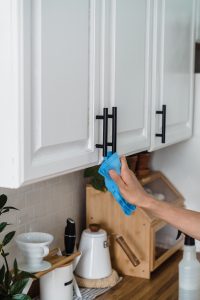
- In her book The Miracle of Vinegar, cleaning expert Aggie MacKenzie lists the many uses of this natural wonder – from cleaning yellow armpit stains in shirts and freshening baby clothes to keeping loo limescale at bay.
- Use an EcoEgg for laundry instead of chemical detergents, helping to save tonnes of washing detergent from polluting water systems every year. The washing beads inside the egg last for 70 washes until you need to get refills.
- Wash clothes only when needed – fluff in the washing machine is your clothes getting worn out as you clean them.
Eco-author Jen Gale points out in her book The Sustainable (ish) Living Guide that in the UK we recycle less than 50 per cent of our waste and lots of reusable items are discarded every day. So reduce what you buy and reduce what’s already there. Decluttering can feel overwhelming but here’s a way to turn it into a game that even children could get involved with. Not only are you freeing up space in your own home but you’re passing things on to other people that they might need or would love. The game is recommended by the minimalist gurus, the Minimalists. Its suitability depends on how crammed your house is.
The Mins Game
Pick a month and on day 1 you get rid of one thing and on day 2 two things and so on until you’re getting rid of 30 things on day 30. By the end of the month you will have cleared your home of 465 items. One suggestion is to reverse this and do 30 items on day 1 when you’re feeling most motivated.
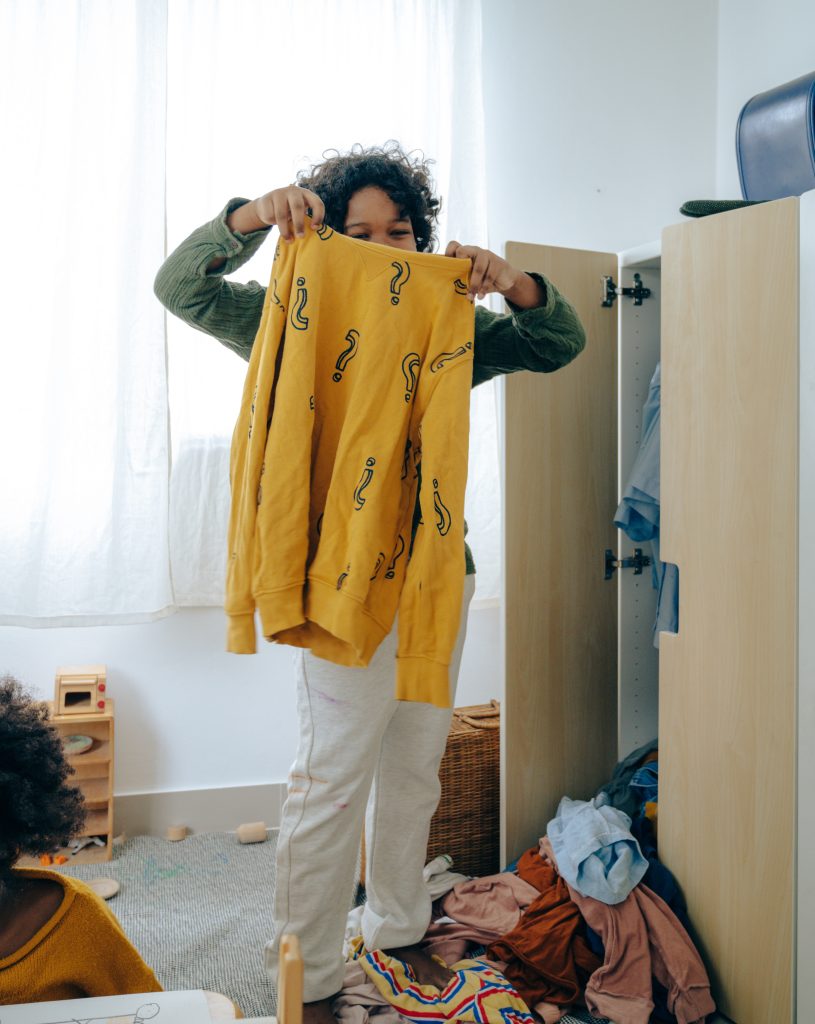
KITCHEN
- If you’re turning on your oven, maximise its shelf space. With a bit of planning you can roast a tray of fruit as a cake cooks. Set time aside to cook a few meals with similar base ingredients, using all the shelves.
- Use up limp veg in soup. You can also chop up wilting veg and add them to a bag in the freezer labelled ‘soup’. Then with the addition of a stock cube and a bag of lentils you have a dish that is cheap, easy and healthy.
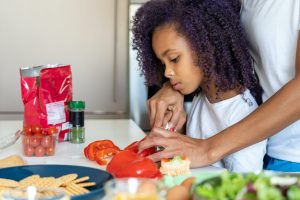
- A well-stocked freezer means there’s always a meal on hand. Divide dishes into different portion sizes to minimise waste and freeze things flat to maximise space.
- Bigger and better value bags are often to be found at international grocers or the international aisle in supermarkets.
- Can you get more tea from your teabag if you make it in a teapot? We read recently that one teabag can make four cups. This may need putting to the test in the GGS office.
- Look up home hacks by the media star Armen Adamjam, such as the tip that made him famous on social media – how to grow an onion. You can actually place the chopped-off white ends of a spring onion into a cup filled with water and regrow them.
- Another Adamjam tip to regrow a pineapple: Twist off the top from a pineapple then peel off the bottom four layers of leaves. Leave the top to dry out for two days. Place over a glass of water somewhere well-lit and away from direct sunlight – only submerge the leaf-free part in the water. When roots have grown, get a pot with soil in it. Make a hole in the middle and plant the top. Water it from above only.
- Making your own butter is satisfying and saves pounds. A friend found this tip on Instagram and inspired me to try it – £1 of whipping cream can make £7-worth of butter. Whisk the whipping cream until you get a separated buttermilk liquid and butter mixture. Add salt or other flavouring if desired. The butter lasts for a week in the fridge or you can freeze it and get small amounts out as needed. Next time I try this I will use a large bowl so I don’t end up splattering myself in the process…
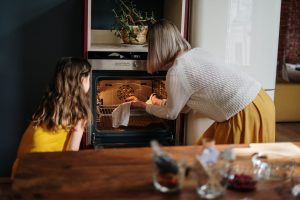
- Another friend has inspired me to make my own yogurt after giving me her tasty homemade version made from milk and a pot of live yogurt cooked in a slow cooker wrapped in a damp towel.
- In his book How Bad are Bananas? Mike Berners-Lee recommends eating less meat, especially beef and lamb. If you do buy them, try to ensure they are from mainly grass-fed animals that are not on deforested land or land that should be used for crops (good options would be British hill sheep and cows).
- Buy only what you know you can eat. Give away food before it goes to waste. Check what needs eating before you go to the shops.
SHOP:
- Buy sustainably – Clothing that I’ve bought from Thought and Traidcraft (now called Transform Trade) are still going strong years later. They wash and wear well and often prompt compliments.
- Textiles made from plastic bottles are used to make Weaver Green’s outdoor rugs, throws and cushions. These can be left outside, don’t fade or rot and can go in the washing machine. Wrapping up in a cosy outdoor blanket can also mean an extra hour or two in the garden if the evening gets cool. The company’s founders drew inspiration for the fabric when they saw a fisherman in Turkey unravel discarded plastic bottles with a knife and then heat bond it to form a rope.
- Patagonia has a target to use only recycled and renewable materials by 2025.
- Swimwear made from discarded fishing nets and other plastic fished from the sea is the brainchild of the sustainable clothing brand Stay Wild Swim.
- The UpCircle Beauty company uses used coffee grounds as raw materials. Instead of ending up in landfill, discarded coffee grounds are turned into vegan-friendly cosmetics such as scrubs, cleansers, creams and moisturisers. The company get the coffee grounds free from more than 100 cafes. The cafes also save on disposal. Win-win.
- FoodCircle Supermarket is an online retailer selling energy bars, healthy snacks and other foods that haven’t made it onto shop shelves for various reasons – perhaps because stock has been overproduced by the manufacturer or has short shelf life or minor defects. Products are sold at discounts of up to 50 per cent. In its first two years the company had saved 500,000 food items from landfill.
- I had never heard of visible mending until I read Jen Gale’s book. This is a form of repair – or ‘codesign’ – that emerged in the early 2010s in response to issues of overproduction, pollution and worker insecurity in the mainstream fashion industry. The philosophy is that clothing is customizable, not disposable. This is a community that wears their mend with pride. See the website visiblemending.org and Instagram. The examples shown look like works of art.
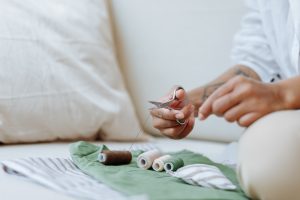
- COMPOST!
As compost-heads, we can’t end without encouraging you to encourage everyone you know to compost. Turning your food and garden waste into compost to rebuild soil is a no-brainer. This is even more important if your local council is one of the 50 per cent in England who have not yet implemented a separate food waste collection scheme, meaning tonnes of food scraps are still going to landfill or incineration.
Let’s spread the word, spread the love and spread the compost!
Julie
